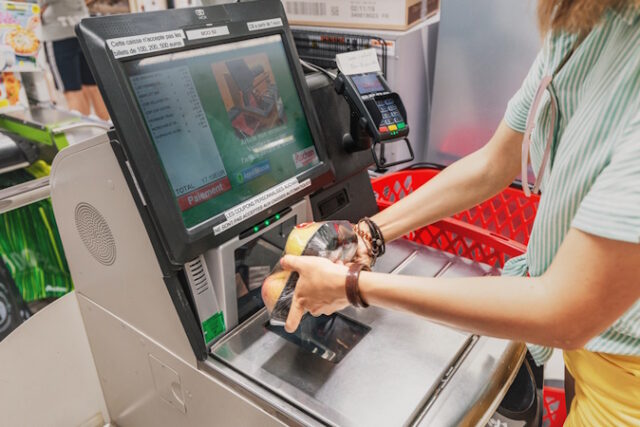
By Thomas Germain / Gizmodo
Don’t ring the funeral bells just yet, but the self-checkout kiosk horror show could be nearing its end. So far, the grand experiment in robot cashiers is an abject failure.
Stores across the country are reversing course on the machines, and consensus is growing among analysts and insiders that self-checkout has been a disaster for consumers and retailers alike, according to a new report in the BBC.
The machines aren’t disappearing anytime soon, but if nothing else, you can expect fewer stores to force them on you in the near future.
In 2023, Target restricted self-checkout kiosks in some stores to ten items or less. Walmart pulled the machines out of a number of locations altogether. Booths, a British grocery chain, abandoned self-checkout entirely. Dollar General made enormous bets on self-checkout tech in 2022, but it recently announced the project flopped.
On a December earnings call, Dollar General CEO Todd Vasos said the retailer is planning to increase the number of employees in stores, particularly in the checkout area, in a major reversal of its checkout strategy.
“We had relied and started to rely too much this year on self-checkout in our stores,” Vasos told investors. “We should be using self-checkout as a secondary checkout vehicle, not a primary.”
The biggest problem is theft. Not only is it easy to steal from self-checkout machines, it can be hard not to steal from them. Shoppers are reportedly 21 times more likely to sneak items past machines than human cashiers, but consumers also constantly steal unintentionally because the self-checkout process can be so cumbersome.
One in five shoppers reported that they’ve accidentally stolen items during self-checkout in a survey from Lending Tree. One in seven said they’ve stolen from self-checkout on purpose.
Not only do self-checkout machines double theft rates, they actually increase labor costs thanks to employees who get taken away from their other duties to help customers deal with the confusing and error-prone kiosks. Overall, some analysts say the machines increase costs overall, which is especially painful news for the industry because they’re so expensive to install. A system of four machines can cost upwards of six figures.
Still, 60% of consumers said they prefer self-checkout as of 2021. That’s true even though 67% said they’ve had self-checkout machines fail. But a growing number of consumers are souring on self-checkout, thanks to endless frustrations, accusations of theft, and wasted time.
Big retailers would love to give hard-working people’s jobs to robots, and in many cases they already have. It turns out human beings might still have something to offer.
This article originally appeared on Gizmodo.
Disclaimer
Artificial Intelligence Disclosure & Legal Disclaimer
AI Content Policy.
To provide our readers with timely and comprehensive coverage, South Florida Reporter uses artificial intelligence (AI) to assist in producing certain articles and visual content.
Articles: AI may be used to assist in research, structural drafting, or data analysis. All AI-assisted text is reviewed and edited by our team to ensure accuracy and adherence to our editorial standards.
Images: Any imagery generated or significantly altered by AI is clearly marked with a disclaimer or watermark to distinguish it from traditional photography or editorial illustrations.
General Disclaimer
The information contained in South Florida Reporter is for general information purposes only.
South Florida Reporter assumes no responsibility for errors or omissions in the contents of the Service. In no event shall South Florida Reporter be liable for any special, direct, indirect, consequential, or incidental damages or any damages whatsoever, whether in an action of contract, negligence or other tort, arising out of or in connection with the use of the Service or the contents of the Service.
The Company reserves the right to make additions, deletions, or modifications to the contents of the Service at any time without prior notice. The Company does not warrant that the Service is free of viruses or other harmful components.












